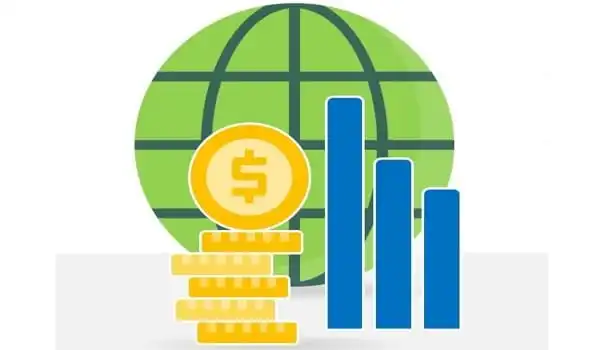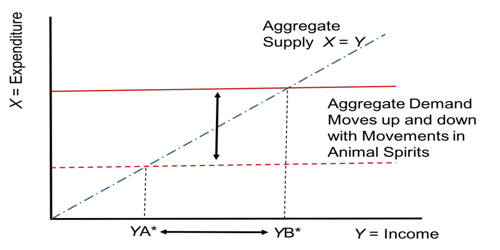According to an interdisciplinary group of scientists, the heady days of rapidly rising prosperity may be coming to an end. Developed democracies, in particular, appear to be the first in line for a long-run economic slowdown in the twenty-first century, which, according to the researchers, should prompt some planning for the additional fiscal and social stress that it will bring.
We have been experiencing unprecedented global economic growth. Despite depressions, recessions, and other economic downturns, the last century has been unlike any other in terms of overall Gross Domestic Product (GDP) per capita growth. It is the result of a powerful combination of technology, as a result of the Industrial Revolutions, and economic and political freedom and stability, as a result of the spread of democracy.
According to an interdisciplinary group of scientists at UC Santa Barbara and the University of Colorado Boulder, the heady days of rapidly rising prosperity may be coming to an end. Developed democracies, in particular, appear to be the first in line for a long-run economic slowdown in the twenty-first century, which, according to the researchers, should prompt some planning for the additional fiscal and social stress that it will bring.
Given that the future economic costs of human-caused environmental challenges like climate change can be enormous, aggressive action today on effective solutions is critical to limiting future economic declines.
Steven Gaines
“Long-run growth slowdowns in rich countries are unavoidable for a variety of reasons that we really don’t have control over,” said Matthew Burgess, lead author of a paper published in the journal Nature Human Behaviour. “No one knows for certain what will happen, but there is this long-term pattern of declining growth that has been visible since the middle of the last century.”
Aging populations, shifts from goods to services, slowing innovation, and debt are some of the factors that could contribute to this potential slowdown. According to the researchers, the long-term effects of COVID-19 and climate change could further stifle growth.
“Given that the future economic costs of human-caused environmental challenges like climate change can be enormous, aggressive action today on effective solutions is critical to limiting future economic declines,” said Steven Gaines, a co-author of the paper.
The news isn’t good for rich, democratic countries like the United States, which rely on long-term economic growth to fund many of their social safety net programs, job-creation investments, and debt repayment. Individuals would be affected as well, as slowing economic growth affects investments and savings for education and retirement.
“I don’t think there’s a deep appreciation of how much of our society has been built on growth,” Burgess said, adding that the slowdown could last decades. While rapid growth has been implicated in many of our ecological woes, frequently prompting calls from the ecological community to slow down, he believes the position has been politically unrealistic thus far. The question now is, regardless of politics, what if slow growth is unavoidable?

A ‘Guided Civic Revival’
“We need to start imagining a slow- to no-growth world,” said Burgess, who is careful to point out that the last hundred years of economic growth have been the exception rather than the rule in the grand scheme of civilization. “We take for granted the kinds of growth we’ve seen in the last hundred years because so much of our memory and ways of studying economics arose during this time when we were growing,” he said.
To weather the potential long-term economic winter, the researchers propose a “guided civic revival,” which combines grass-roots, bottom-up civic forces with government participation. Its goals would be to decouple social capital and individual well-being from economic growth, to reduce inequality, to improve opportunities for youth, to increase the return on investment in government spending and taxation, and to protect core institutional elements of democracy so that they can withstand stress. What is the endgame? To foster unity in the midst of a storm of fiscal stresses that threaten not only our wallets but also society and democracy.
“I think the most important question to ask is how do we build social solidarity in a context where everything feels zero-sum,” Burgess said. “How do we adjust expectations, second?” For as long as most of us can remember, growth has been assumed; it’s part of the American Dream that children will eventually outperform their parents economically. According to Burgess, recent statistics show that dream is fading, with at best half of people in their 30s today earning more than their parents. Nonetheless, many people continue to believe that their ship will arrive.
“There’s a lot of evidence that a mismatch between expectation and reality can be a catalyst for political unrest, particularly among middle- and upper-class youth,” he said.
Other exercises in solidarity-building focus on developing a strong, shared identity while also allowing for ethnocultural diversity and reducing economic inequality by lowering barriers to public education and providing job-relevant training.
Meanwhile, the government can implement fiscal strategies such as increasing the efficiency of public spending and reducing waste. The researchers propose spending on education, R&D, and infrastructure, as well as closing costly tax loopholes, reducing corruption, and reforming the economically inefficient healthcare system. Savings and debt – our mechanisms for investing in the future as well as dealing with the present – may need to be rethought in a stagnant economy, as exponential growth may no longer be relied on to reward us for purchasing a home, contributing to education, or saving for retirement.
Burgess explained that the measures proposed by the researchers are intended to be starting points for thinking about a slow-growth future. They could also be associated with a shift in the assessment of well-being away from monetary and material wealth and toward more subjective feelings of security, strong connections with family, personal freedoms, health, meaning, purpose, and moral satisfaction.
“How does a successful, developed democracy look in the face of long-term stagnation?” Burgess explained. “Nobody really knows because it hasn’t happened in the modern United States. The primary goal of this paper is to initiate a discussion.”
















